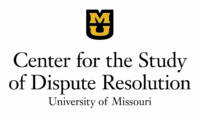Center for Intellectual Property & Entrepreneurship

The Center for Intellectual Property & Entrepreneurship promotes faculty symposia and scholarship in all areas involving law and innovation and develops curricular and extracurricular programming to prepare law students to participate in entrepreneurial and innovation communities.
The center also supports the law school’s Office of Career Development in identifying externships, summer positions and full-time jobs within the center’s focus area, and collaborates with campus and community members to generate resources that will increase and promote innovation and entrepreneurship throughout the reason. The center’s focus resides not just on intellectual property, business and finance, but on the intersection of science, technology, engineering and math (STEM) issues.
Center for the Study of Dispute Resolution

The mission of the Center for the Study of Dispute Resolution is to advance the understanding of the nature and causes of, as well as the methods available for managing and resolving conflict.
The CSDR fosters comprehensive approaches to lawyering, and decision-making through the use of the full array of dispute resolution processes including negotiation, mediation, arbitration and litigation.
Veterans Clinic
Under the supervision of experienced attorneys, law students at the Mizzou Law Veterans Clinic help veterans – free of charge – with discharge upgrades and Department of Veterans Affairs disability compensation claims. In addition to directly representing veterans with their disability claims, the Clinic also participates in high level amicus brief writing, training and education for practicing attorneys, rural veteran outreach through Tigers for Troops, and more.
Entrepreneurship Legal Clinic
The law school’s Entrepreneurship Legal Clinic (ELC) was launched in the fall of 2015 to provide clinical opportunities for students to work with small and start-up business clients. The clinic assists members of the university and Mid-Missouri communities seeking to start businesses by providing supervised legal services involving entity planning and formation, governance issues, employee issues, intellectual property analysis, governmental regulations and contract drafting.
Innocence Clinic
Since 2007, students at the University of Missouri School of Law have been working with the Midwest Innocence Project (MIP), a non-profit organization located in Kansas City, Missouri, to investigate cases of possible innocence in five Midwestern states. MIP’s mission is to educate about, advocate for, and obtain and support the exoneration and release of wrongfully convicted people in the Midwest.
Pro Bono
A formal pro bono program was established in 2013 to encourage students to engage in pro bono and civic activity while also being able to gain practical lawyering skills and serve persons with limited means.
The Mizzou Law Pro Bono Program does not provide any direct legal assistance. Law students are not permitted to represent individuals in legal matters unless they are working under the supervision of a licensed attorney. For this reason, we do not refer individuals or organizations seeking assistance to private attorneys. If you believe you need a lawyer, please contact the state bar association at https://mobar.org/. You may also find information regarding legal aid programs providing free legal help to low income and disadvantaged people in Missouri at https://www.lsmo.org/.
Any first-year student who completes 10 pro bono hours, and any second- or third-year student who completes 20 pro bono hours will receive a pro bono certificate at the end of the year recognizing their contribution. Special recognition may also be given to a limited number of students whose commitment to pro bono work was exceptional.
In accordance with ABA standards, the program defines pro bono broadly to include activities for the benefit of persons of limited means, whether or not law-related. In addition, work done for a non-profit with 501(c)(3) status and some governmental entities will also qualify. Participation in activities that grant school credit (such as an externship or clinic) will not qualify, but if the student completes hours above and beyond those required to receive credit, those hours may qualify.
Judge Lawrence G. Crahan Judicial Fellowship
 Pictured (left to right) Dean Lyrissa Lidsky, former Crahan Fellow Lauren Vincent, ’19, Judge Philip M. Hess, ’83, Linda S. Legg and Judge Glenn A. Norton, ’85.
Pictured (left to right) Dean Lyrissa Lidsky, former Crahan Fellow Lauren Vincent, ’19, Judge Philip M. Hess, ’83, Linda S. Legg and Judge Glenn A. Norton, ’85.Each year, one or more first-year law students from the School of Law are awarded the Judge Lawrence G. Crahan Judicial Fellowship, to serve for eight weeks as a judicial clerk for one or more judges. The awardees have demonstrated academic excellence, leadership and an interest in a judicial clerkship upon graduation. The fellowship is named in honor of Lawrence G. Crahan, ’77, who was appointed to the Missouri Court of Appeals, Eastern District, serving as a chief judge in 1997 and 1998. He was a judge on this court at the time of his death in 2005. Crahan’s widow, attorney Linda S. Legg, oversees the program each year, getting to know the Crahan Fellows personally to tell them the story of the man for whom the award is named, and to make sure that the fellowship is serving its purpose.
Shook Hardy & Bacon Foundation Summer Judicial Intern
Each year, a University of Missouri law student from a demographic group underrepresented in the legal profession is selected to be a judicial intern during their first-year summer with one of the judges on the Missouri Supreme Court. Through this experience, the selected student is able to view the workings of the court from behind the scenes and develop meaningful relationships with judges and court staff. Student interns also gain an understanding of the processes utilized by the judges to reach unbiased and fair decisions and solve legal conundrums. It is the goal of this program that the students grow more comfortable in a courtroom setting, develop their legal research and writing skills, and gain confidence in law school and as they move into their own practice.
Students are selected by a competitive application process. Through the generosity of the Shook Hardy & Bacon Foundation, the selected student receives a stipend of $5,000.
ACC-St. Louis Diversity Summer Internship Program
The ACC-St. Louis Diversity Summer Internship Program is designed to provide first-year law students with exposure to and experience in an in-house practice. It is also designed to be a “diversity pipeline,” opening up opportunities for law students that may lack access to or knowledge of an in-house legal practice, including students from demographic groups who are under-represented in the legal profession and students whose family backgrounds lack in professional careers, college degrees or exposure to the law. Interns are matched with a member corporation, where they will work during the summer. The program is designed to expose interns to the various areas of legal advocacy and general corporate practice that in-house counsel handle, as well as the relationship between providing business and legal advice to clients in a variety of substantive areas.
The program accepts applications from law students at the University of Missouri, Saint Louis University and Washington University, with the goal of selecting two students from each school. Students selected for the program are paid a total of $6,000 for ten weeks of work.